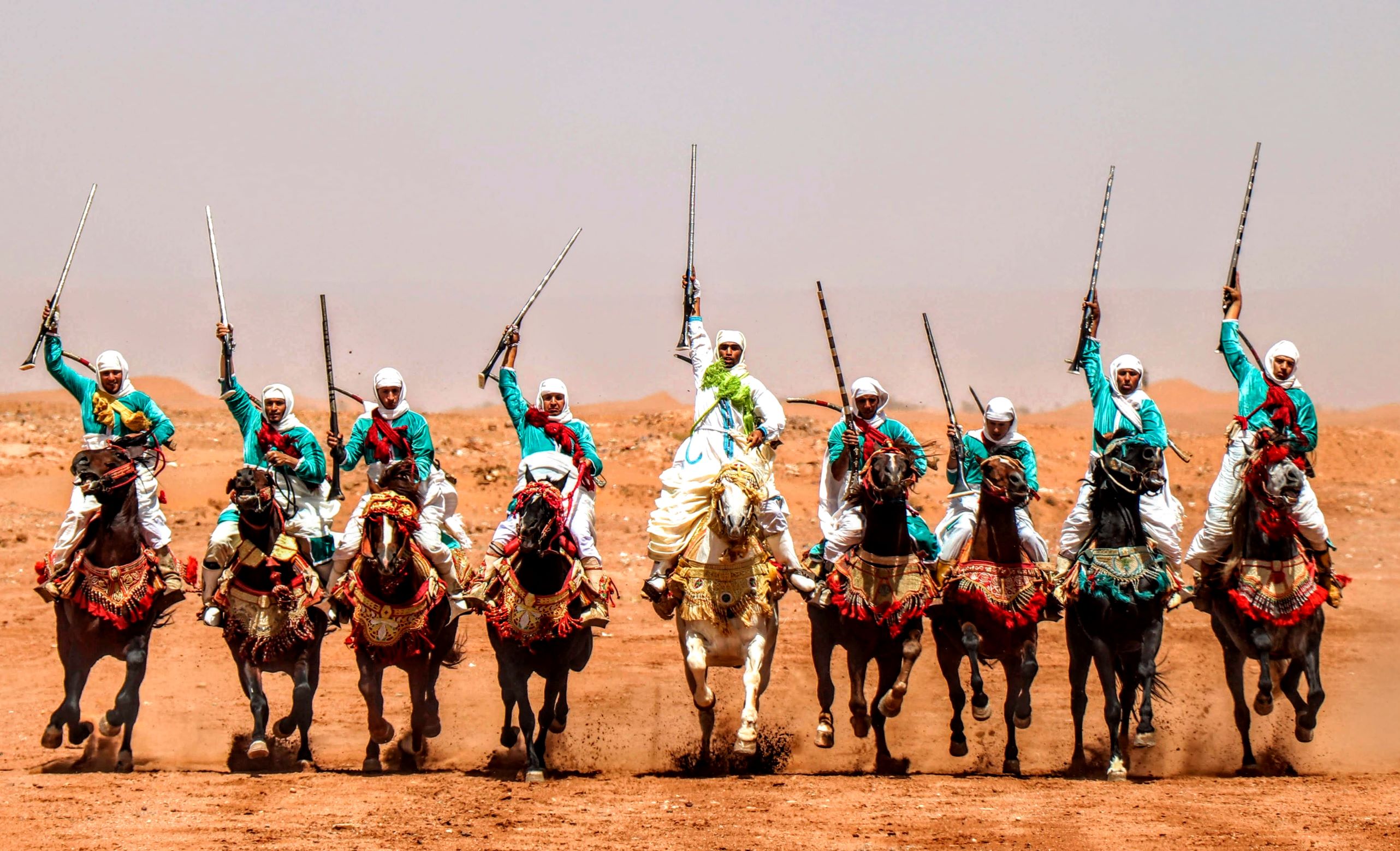
Fantasia (Algeria, Morocco, Tunisia, Libya, Mali, Niger, Mauritania)
- Name of sport (game): Fantasia
- Name in native language: In the Maghreb, fantasia is generally called laâb el-baroud («game of powder») or laâb el-kheil (or «horse game»); more local names also exist: tbourida in Morocco
- Place of practice (continent, state, nation):
Algeria, Morocco, Tunisia, Libya, Mali, Niger, and Mauritania
- History:
Fantasia is a traditional exhibition of horsemanship in the Maghreb performed during cultural festivals and for Maghrebi wedding celebrations. It is present in Algeria, Morocco, Tunisia, Libya, Mali, Niger, and Mauritania.
The fantasia is indirectly related to a very old Berber equestrian tradition, to be related to the introduction of the bearded horse, which was particularly used among the Eastern Libyans to tow tanks, from the XIIIth century BC., then, during the following millennium, adapted as a mount by the Paleo-Berbers, with, later, the riders of the famous numid cavalry of King Massinissa.
Reported at the end of the 18th century by the testimonies of travelers in the Maghreb, it will be formally known, and will take the name of fantasia, from 1832, thanks to the French painter Eugène Delacroix and the paintings he makes of it. It then became one of the favorite subjects of the most illustrious Orientalist painters, such as Eugène Fromentin or Marià Fortuny. - Description:
The performance consists of a group of horse riders, all wearing traditional clothes, who charge along a straight path at the same speed so as to form a line, and then at the end of the charge (about two hundred meters) fire into the sky using old muskets or muzzle-loading rifles. The difficulty of the performance is in synchronizing the movement of the horses during acceleration of the charge, and especially in firing the guns simultaneously so that one single shot is heard. The horses were bred from the Arabian and Barb breeds or a mixture of the two.
The fantasia is considered a cultural performance and a kind of martial art; it also symbolizes a strong relationship between the man (or woman) and the horse, as well as an attachment to tradition. It is historically related to the famous Numidian cavalery charge.
Fantasia performances usually take place during local seasonal, cultural or religious festivals, also called moussem ("saint's day festival" in Arabic). - Current status:
Algeria
The Algerian Equestrian Federation is the body responsible for the organization and development of modern and traditional equestrian practice in Algeria, including fantasia. 140 equestrian associations, organized in nine regional leagues (Aurès, Hodna, Oasis, Dahra, Titteri, Sersou, Saoura, Tafna and Sahara) are affiliated.Morocco
Nowadays, the practice of fantasia remains very lively in Morocco and also concerns women. Its organization and development are the responsibility of the Royal Moroccan Federation of Equestrian Sports. Nearly 1,000 troops, called sorbas, with nearly 15,000 horses, were engaged in the exercise of fantasia. In 2008, the Royal Complex of Equestrian Sports and Dar Es-Salam Tbourida was created, a structure dedicated to equestrian practice and including a school of fantasia and workshops for making riders' clothes and making harnesses.
This complex also hosts, every year, the Hassan II Trophy of Traditional Equestrian Arts (tbourida), a national fantasy competition, comprising three categories: senior men, senior women and junior boys. The trophy consists of two events: harda (salvation), assessing the appearance of the teams (clothing of the riders, harnessing of the horses, handling of the weapons), and talqa, assessing the alignment of the riders and the synchronization of the shots of the rifles. - Importance (for practitioners, communities etc.):
Today, fantasia is symbolically present for the holidays and represents the supreme celebration or apotheosis of a great religious event like Eid al-Fitr. The horses are richly harnessed and can participate from the beginning of the festivities, including escorting the bride. The horseman carries the mukhala, the famous black powder rifle.
In Morocco, the practice of fantasia remains very lively. There are now 1,000 sorbas (troops) and 15,000 active horses. - Sources of information :
Video:
https://www.youtube.com/watch?v=avBCtAiwyUg
https://www.youtube.com/watch?v=27PEwSRgvD0
https://www.youtube.com/watch?v=WLk7jfE0N8w
https://www.youtube.com/watch?v=SzRYCPO7-4oPhoto: Guillaume Lanouhe, Brev’Art
- Gallery:

